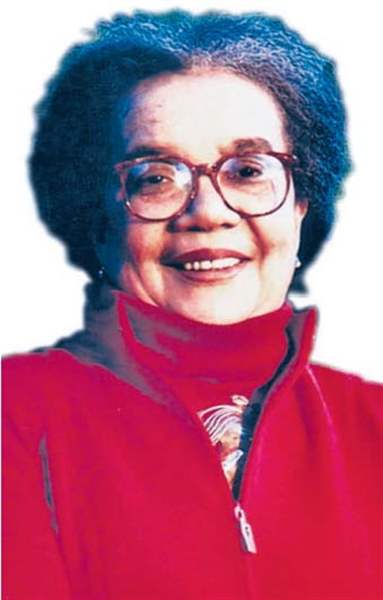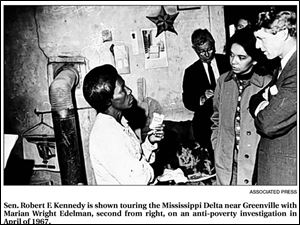
A warrior for children, Marian Wright Edelman has devoted her life to battling poverty
4/13/2008
Edelman

Edelman
Optimistic and deeply spiritual, Marian Wright Edelman has been a strong, articulate voice for the voiceless for more than 40 years.
Founder and president of the Children s Defense Fund, she will speak at 7 p.m. Wednesday in the Great Hall of the Stranahan Theater as part of the Authors! Authors! series.
Edelman, 68, has written Families in Peril: An Agenda for Social Change and
inspirational books, including I Can Make a Difference: A Treasury to Inspire
Our Children, and Guide My Feet: Prayers and Meditations on Loving and Working For Children.
Every 35 seconds a baby is born into poverty and every 41 seconds a baby is
born uninsured. In rich America these numbers are horrifying and unacceptable,
she wrote last week in an e-mail interview with The Blade. We do not have a money problem in America; we have a values problem.
That one in six children is poor (one in every three black, one in every four Latino, and one in every 10 white children) shows that they are not a priority to our elected leaders, she wrote. In 1968, the year that Martin Luther King, Jr., and Robert Kennedy were killed, 15.6 percent of American children lived in poverty; today, 17.4 percent do, lagging behind their more fortunate peers in health, emotional and intellectual development, and school performance.
Wrestling with the issues for decades, she knows what will turn it around.
It s time for adults of every race and income group to break our silence about the pervasive breakdown of moral, family, community, and national values, and to
place our children first in our lives.
The CDF has an annual budget of $25 million from foundation and corporate
grants and donations, and a staff of 180 working at offices in Washington and
nine states. In Ohio, it has offices in Toledo and Columbus.
In a January speech at Duke University commemorating Mr. King, she said, Every poor child could be lifted out of poverty for less than five months of the Iraq war spending last year and less than nine months of the tax cuts for the top one percent of richest taxpayers.
What do you think is more important to the future of America: more tax cuts for our richest Americans or hope and basic necessities for 13 million children, a majority in working families?

She delivered several such tribute speeches this year, nudging listeners by saying that too many Americans would rather celebrate an enshrined Mr. King-the-dreamer than follow Mr. King-the-disturber-of-all-unjust-peace.
The Congressional Research Service says the Iraq war will cost us over $600 billion by the end of 2008. The Bush tax cuts which began in 2001 will cost us about $2 trillion over 10 years or much more if extended. With this money, we could save the lives of millions of people on our Earth and replace the terrors of poverty and war with hope and health care and clean water and education for all God s children in our global family, she said at Duke.
Model student
The mother of three grown sons who she raised in Washington with attorney Peter Wright Edelman in a blend of Jewish and Christian traditions, she was valedictorian in her high school and Spelman College graduating classes before earning a law degree from Yale University.
She was born in June, 1939, and named for a woman who was at the center of one of the most significant racial events of the young 20th century. Famous contralto Marian Anderson, who was African-American, was told by the Daughters of the American Revolution she could not sing in Washington s Constitution Hall, triggering widespread outrage. First Lady Eleanor Roosevelt lead the protest of racism by resigning her membership in the DAR and arranging for Ms. Anderson to sing on the steps of the Lincoln Memorial on Easter, 1939. A multiracial crowd of 75,000 attended.
Reared in tiny Bennettsville, S.C., Edelman was the youngest of five children born to hard-working parents who filled their home with books and believed in improving the community. Her father, the Rev. Arthur J. Wright, was pastor of the town s Shiloh Baptist Church. He kept a steel helmet he d worn in World War I that had a hole in it from a bullet that had grazed his skull. He was committed to his African-American parishioners and to teaching them to be productive, fulfilled, and responsible. When the town s black children weren t allowed to play on the public playground, he built one on the church grounds.
Her mother, Maggie Leola Bowen Wright, herself the daughter of a Baptist minister, was a musician, the church organist, choir director, the church s chief fund-raiser, and eventual foster mother. She taught her daughters to play the family s baby grand piano, and then brought in teachers.
Always a model student, Edelman was described by friends as outgoing and caring, and a baton-twirling majorette. As a sixth-grader, she wrote an essay entitled Barriers of Racial Injustice do not have to be Insurmountable. Like her older siblings, she went to college, attending the all-female, African-American Spelman College in Atlanta. There she met Howard Zinn, an activist, political scientist, and author of A People s History of the United States, who became a great influence.
She became increasingly aware of racism, and in 1960 she joined other Atlanta students in a sit-down at restaurants that did not serve African-Americans. At Yale and then working for the NAACP in Jackson, Miss., her political awareness, activism, and connections grew.
She was an early advocate for Head Start funding and refunding. After testifying about starvation in Mississippi to the members of the Senate subcommittee on Employment, Manpower, and Poverty in 1967, she urged them to come South and see for themselves. When they did, including Sen. Robert Kennedy, she took them to shacks where they saw listless children with the bloated bellies of malnutrition. As a result, food stamps, which poor people previously had to purchase, were made free.
Children s Defense Fund
The Children s Defense Fund grew out of a project related to the 1968 Poor People s Campaign, which Edelman coordinated shortly after Mr. King had been killed. Thousands of people the poor and religious and labor groups came to Resurrection City, a tent and woodshed settlement constructed on park land not far from the White House, with the aim, ultimately not realized, of grabbing the attention of politicians.
After her 1968 wedding to Edelman, a white Harvard Law School graduate who had been a legislative aide to Senator Kennedy, she undertook an examination of Title I, which was to have spent more than a billion dollars improving education for poor children. She and a small staff at the Washington Research Project and other organizations researched and audited Title I accounts, discovering that money often didn t reach poor children as intended. Their report made the front page of the Washington Post.
In 1971, she was named one of America s 200 young leaders by Time magazine. And two years later, she received grants to found the CDF. Its constituency, she said, would be the nation s poor children. Its work: to decrease teenage pregnancy, increase Medicaid coverage for poor children, and secure funding for programs such as Head Start.
Reason to hope
With perennial optimism, she admits the bar has risen since she was a child.
Children today are blessed with many more opportunities, seeing hope in the Tiger Woods and Oprahs of the world; and having Barack Obama and Hillary Clinton as two leading contenders for the presidency of the United States, she wrote The Blade. Improvements also have been made in areas of high school and college graduation rates, teen birth rates, and infant mortality rates.
What must the next U.S. president do to help kids?
End child poverty by investing in high-quality education for every child, livable wages for families, income supplements like the Earned Income and Child Tax Credits, job training and job creation, and work supports like child care and health coverage, she said.
And, given that states spend about three times as much per prisoner as per pubic school pupil, prevention and early intervention is essential. She points to a local example, the CDF Freedom Schools program that will provide enriching summer and after-school programs at the University of Toledo.
We must also put in place measures to offer quality parent-child home visiting programs, provide comprehensive community family support programs to prevent neglect and abuse, and make available family-based substance abuse treatment centers.
Marian Wright Edelman s Authors! Authors! talk at 7 p.m. Wednesday is cosponsored by The Blade and the Toledo-Lucas County Public Library. Tickets may be purchased at library branches and at the door, and are $10; $8 for students. The Great Hall of the Stranahan Theater is at 4645 Heatherdowns Blvd. Information: 419-259-5266.
Contact Tahree Lane at: tlane@theblade.com or 419-724-6075.